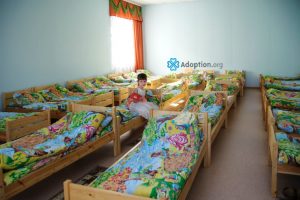As a prospective internationally adoptive parent one of the most important things to understand is what your adoptive child’s life was like prior to placement. While some countries, such as China, are taking steps to place waiting children in foster families many children continue to live in orphanages. While some orphanages may be “better” than others, institutional care for children can profoundly affect their development. The degree of physical, emotional, and social delayed development depends on the nature of the orphanage (child to caretaker ratio being key) and the amount of time the child resides in institutional care.
In 1943 Abraham Maslow published a paper titled “A Theory of Human Motivation.” In it, he outlined the famous pyramid of Maslow’s Hierarchy of Needs. According to Maslow, in order for humans to evolve, their basic needs must be met. At the bottom of the pyramid are physiological needs, such as food, water, and sleep. Next is safety, security, and attachment. Then love and belonging. Once these three basic needs are met, Maslow theorized, humans may continue to grow. Though Maslow’s work centered on evolving into self-actualization, it’s an important model to think about when considering children in institutional care.
Beginning at the most basic level, children in institutional care are often malnourished, anemic, have low muscle tone, or suffer from deficiencies in Vitamin A, Iron, or Vitamin D. This is due to insufficient access to nutritional and fortified foods and even an inadequate exposure to sunlight. Studies by countless authors have shown how malnutrition hinders a child’s ability to grow both physically and mentally. If your body is hungry that is all your brain can focus on. If your body does not have the proper vitamins and minerals, it can’t function correctly. Without proper nutrition, age-appropriate developmental milestones can become insurmountable and neurocognitive development may become delayed.
At the next levels, security, loving, and belonging, children in institutional care are often in survival mode. Depending on the child to caretaker ratios, children may learn their cries are not responded to and being left alone is a common occurrence. For children ages 3 and under, the need for brain stimulation is imperative. As Charles Nelson, professor of pediatrics at Harvard Medical School and Boston Children’s Hospital, relays, “More than a decade of research on children raised in institutions shows that neglect is awful for the brain.” When neglect does happen, children learn self-stimulating behaviors in order to cope, and these habits may last long past their time in institutional care.
Children in orphanages have experienced great trauma and loss. They have suffered through the upheaval of leaving their birth families and being placed in an institution. For them, nothing is fixed or forever. Caretakers may come and go, further leading to difficulties fostering lasting attachments. This can lead to attachment disorders (RAD), attention difficulties, poor impulse control, and difficulty coping with and regulating emotions. In such circumstances, emotional and social development becomes harder and harder for the institutionalized child.
While many factors contribute to a child’s development – including genetics, prenatal environment, and neonatal environment – the effects of institutional care on children cannot be understated. But there is good news. With proper nutrition, attention, and love, many children make rapid gains and are soon on par with their peers. A good ratio to remember is 1:2. For every year your child was in institutional care it will take that long for them to catch up. For example, our son, adopted at 2, fully caught up emotionally, socially and physically at age 4. Just be patient and know that it will take some time.
Every child is different and your child has already been through a lot in their young life. It may help to manage family, friend, and school expectations for your child. Stay supportive and remember to keep informed so you can advocate for your child when the time comes. Under the federally mandated Individuals with Disabilities Education Act counties and schools across the country have programs available to you. Know your rights and don’t hesitate to seek help when your family needs it.
For help adopting an orphan during a foreign adoption, visit Adoption.com/international. If you want to know more about adoption or child development, visit Adoption.com.
Jennifer S. Jones is a writer, performer, storyteller, and arts educator. In a small government office in China, Jennifer became an adoptive mother. She is passionate about the adoption community and talks about the ins and outs, ups and downs, joys and “Is this really us?!?” whenever she can. She writes about her experiences at www.letterstojack.com
